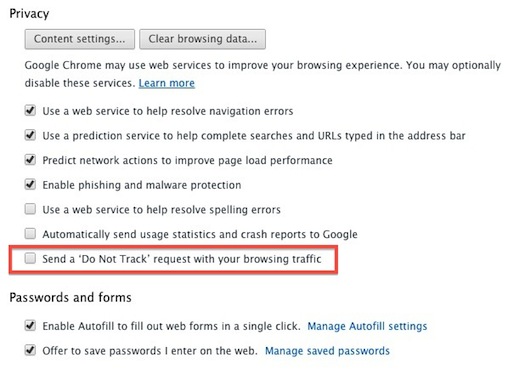Google yesterday made good on a promise from earlier this year and shipped Chrome 23 with the "Do Not Track" privacy feature.
In September, Google added a Do Not Track (DNT) option to Chrome's precursor, the open-source Chromium, and reiterated that it would meet its end-of-year deadline for baking it into the "stable" build of the browser.
In February, Google had said it would add DNT support to Chrome after the White House said it would introduce new online privacy legislation in Congress.
Chrome was the last major browser to commit to DNT, and the last to roll it into its code. Previously, Microsoft's Internet Explorer, Mozilla's Firefox, Apple's Safari and Opera Software's Opera had added support for the setting, which transmits special information with every HTTP page request to tell sites the user does not want to be tracked by online advertisers.
Opera just barely beat Chrome to the finish line: Its version 12, which was also released Tuesday, appeared several hours before Chrome 23.
Chrome's DNT setting appears under the "Privacy" section of the browser's Settings screen. The latter is dubbed "Preferences" on OS X.
To pull up the Privacy section, users must first click the "Show advanced settings..." link at the bottom of the Settings page. Checking the box marked "Send a 'Do Not Track' request with your browsing traffic" switches on the privacy feature.
Like all browsers except for Microsoft's Internet Explorer 10 (IE10), Chrome leaves DNT turned off by default.
Google, one of the Web's biggest purveyors of online ads, has been noticeably hesitant to adopt DNT, and in a blog post, Ami Fischman, a Google software engineer, hinted at Google's continuing lukewarm support.
"This latest release also includes an option to send a 'do not track' request to websites and Web services," wrote Fischman. "The effectiveness of such requests is dependent on how websites and services respond, so Google is working with others on a common way to respond to these requests in the future."
Although browsers have implemented DNT, Fischman has a point: The crux is websites, which must enable it on their ends. Twitter is the largest online service, by far, to have implemented DNT.
A group composed of advertisers, browser makers, privacy advocates and others has yet to finalize the DNT standard. Work by the Worldwide Web Consortium (W3C) standards-setting body has stalled, with partisans arguing over IE10's on-by-default setting.
In May, Microsoft announced that IE10 would enable DNT by default, but later backtracked a step, giving users a way to switch off the feature during Windows 8 setup. And two weeks ago, the controversy over IE10 and DNT got another jolt when Yahoo announced it would not honor IE10's DNT signal.
Chrome 23 also patched 14 vulnerabilities, six of them ranked "high," Google's second-most-serious threat rating, seven pegged as "medium" and one as "low."
Of the 14 bugs, six were reported by three outside researchers, who were awarded a total of $9,000 in bounties. So far this year, Google has paid out more than $360,000 in rewards, including three payments of $60,000 each for winners of its Pwnium hacking contest. The most recent of those checks went to a teenage researcher known only as "Pinkie Pie," who hijacked the browser at the Hack In The Box security conference last month.
Also included in Chrome 23, Fischman said, are improvements to the browser's graphics rendering technology, which he claimed could extend a notebook's battery life by up to 25% under heavy surfing loads.
Users can download Chrome 23 from this website. If Google's browser is already installed, it will update automatically in the background to the new version.

Chrome puts the 'Do Not Track' setting under the Privacy section of its Settings screen, but unlike Microsoft's IE10, leaves it unchecked by default.





